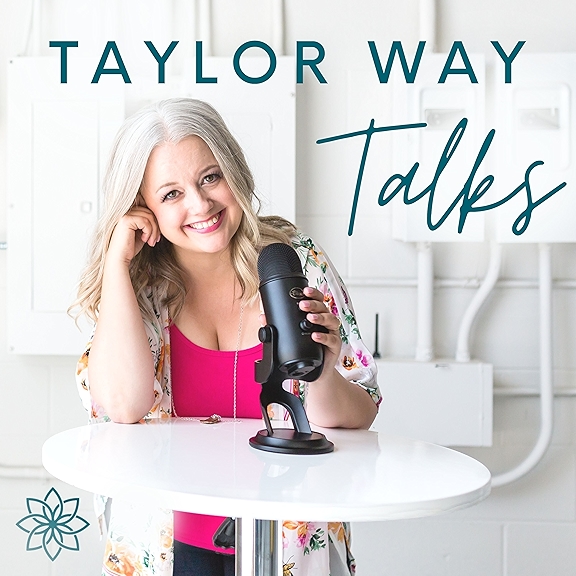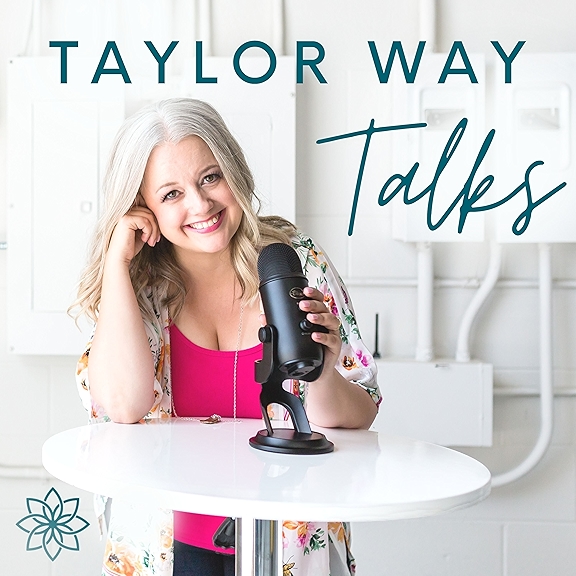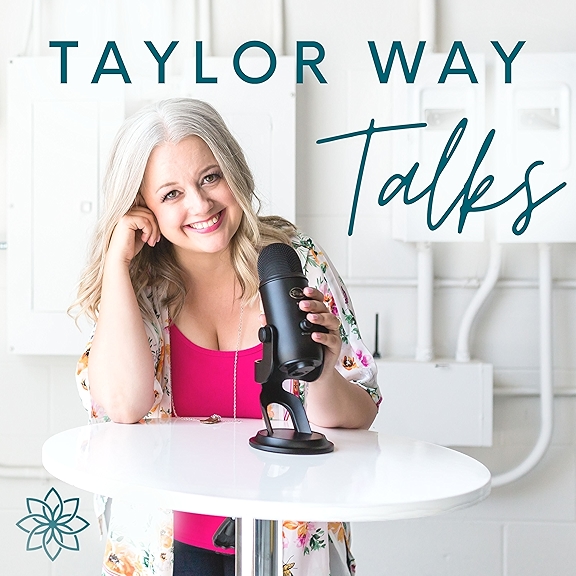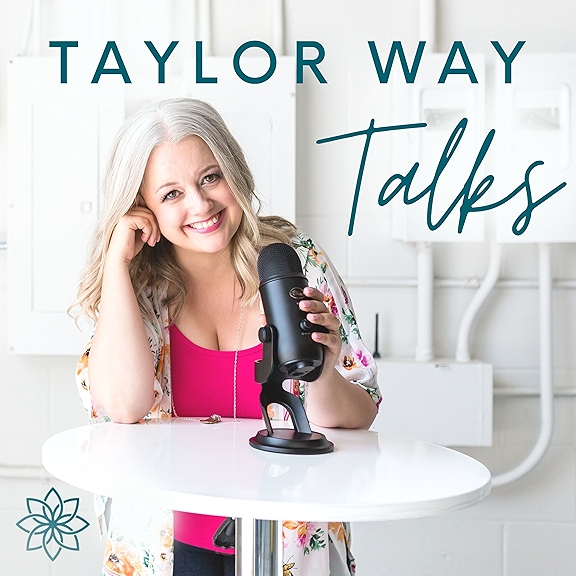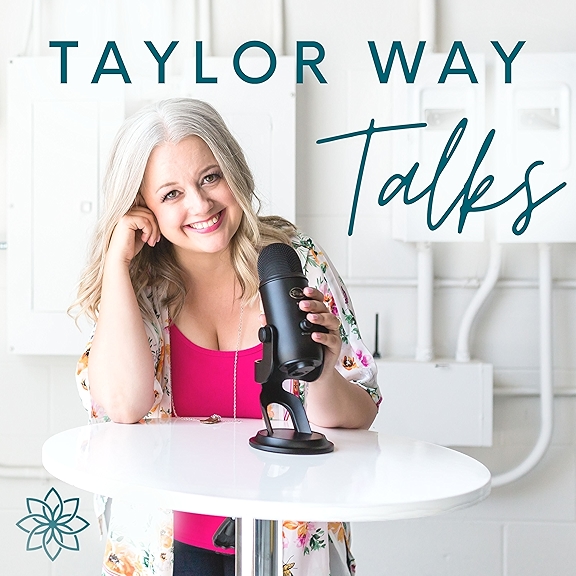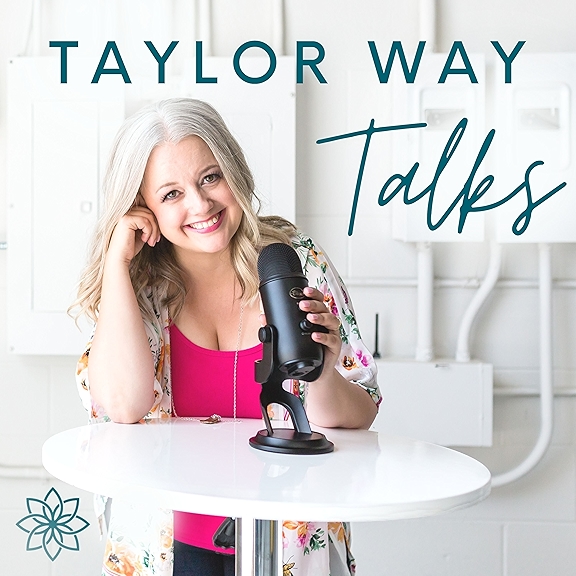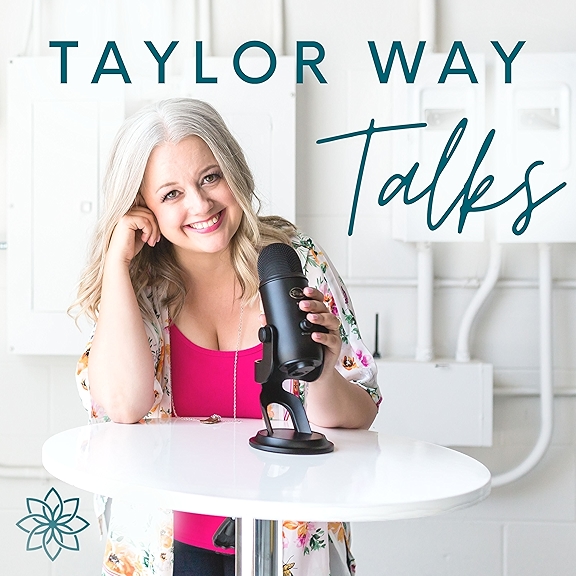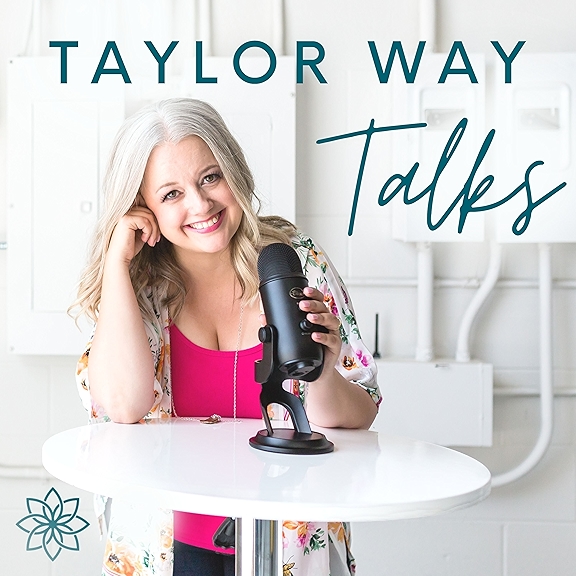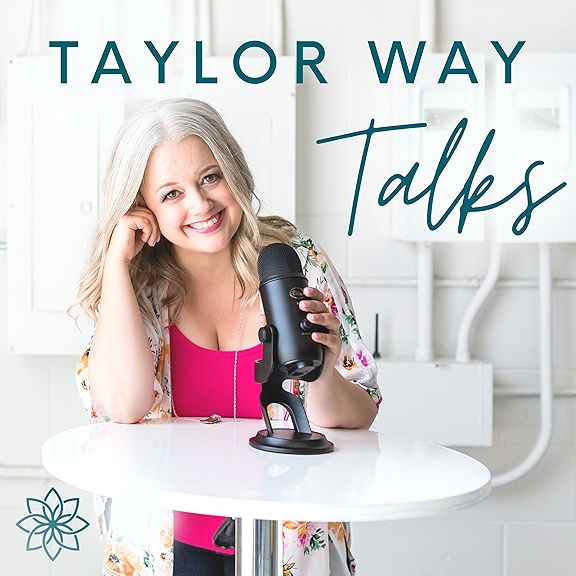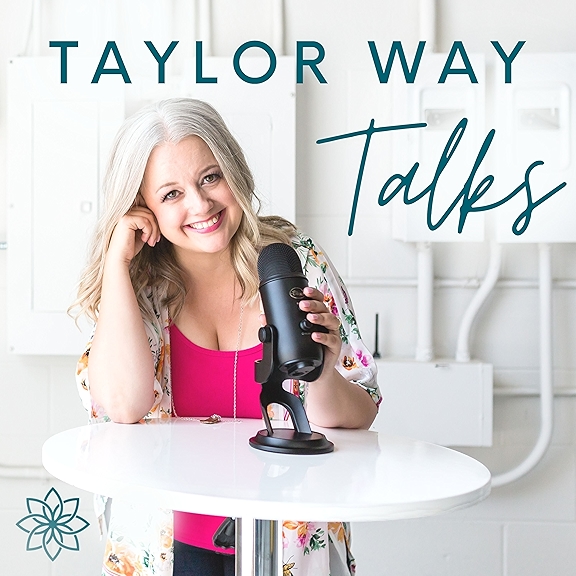26-02-2024
44 - Gisele Denis - The Grind Behind The Beauty
Dawn Taylor hosts renowned Canadian painter Giselle Denis on the podcast. They explore Giselle’s career as an artist and how her passion for art combined with hard work and will power gave her the necessary drive to succeed through years of struggle to gain recognition.Giselle shares an analogy that has guided her life as she was able to realize success: the analogy of starting her journey as an aircraft carrier on the ocean carrying far too much and moving too slowly. She streamlined her life’s boat by removing distractions and things that weren’t serving her so she could move with more agility into artistic success.Dawn and Giselle discuss why Giselle believes it’s of the utmost importance to be yourself in whatever you do and not strive to copy someone else’s success. Giselle explains some of her early art career struggles and why she doesn’t coach other artists. The episode is a unique portrait of the hard work behind a prominent artist.About Giselle Denis:I connect to people in a unique way through my Live Painting Experience. Art has always had a way of breaking down barriers. Time and again it has provided a place where strangers can find common ground and open the door to communicate with one another. I paint Hope. My message is Hope. My story is Hope and my vision is all about Hope. I have a goal to raise $1 million for charity. My live painting for charities has raised over $765,000. One of my paintings sold for $50,000 for Little Warriors. I donate 100% of the money raised through my paintings. I couldn't be happier doing what I love and sharing it with the world. Thank you for reading and for showing interest in my journey.—Resources:“Smart Women Finish Rich: 9 Steps to Creating a Rich Future” by David Bach__ Dawn Taylor - The Taylor Way: website | facebook | instagram | linkedinGiselle Denis: website | instagram | youtubeTranscriptDawn Taylor 00:09Hello, hello. Today on The Taylor Talks podcast, we have the amazing Giselle Denis. She's a world renowned artist, she's a mom, she's a wife, she's a business owner. And this woman has more drive and hustle than most people I've met in my life. But stick around as we're gonna dive into the topic of the grind behind the beauty, what it actually has taken her to get where she is, and some of the amazing things she's learned along the way. I walked away from this recording was so many new strategies for my own life and things I want to change in my own business. So really hope that you enjoy this one as much as I do. So, after the show, listen for instructions on where to find a super fun giveaway. It might even include some of her art. Dawn Taylor 00:53Hey, hey, hey, welcome to The Taylor Talks. I am hanging out with, as you heard, the amazing and beautiful Giselle Denis, the world renowned artist. So conversation that Giselle and I've had over the years, is how easy it looks from the outside. And there's this whole girl boss mentality right now, this, like, it's just so simple and have alignment and flow, and it's just so beautiful and easy. And the hard conversation we want to dive into today is that's not realistic. That's not the reality of it. That's not actually how most businesses are built. So Giselle, let's dive into it. Tell us a little bit about yourself and how this all started for you. Giselle Denis 01:48That's a loaded question. So I've always been an artist, I grew up in an artist home, and just always, always painted. And I started selling my work when I was about 14 years old. I learned realism and I was doing portrait work. And that's how a lot of artists start out selling their work, is, you know, finding a niche. So for me, it was portraits and pencil, and my work doesn't look anything like that now, but I learned really young that people wanted to buy something that I made with my own hands. So that was very appealing to me, I loved to do it anyway, and if people were gonna hire me and give me money to do something that I love with my hands, like, that's amazing. So I just kind of kept going with it. I went to college and studied music for four years. And when I finished college a year later, I got married. And then it was like, okay, now what? What do I want to do? And I just kept going with my art, but as most people know, art sales can be few and far between. And I didn't know how to, like, make a respectable adult income, like, what do I do? So I thought, I'm going to have my own little house cleaning company for a year. I'll work my own hours and the rest of the time I get to control when I work, when I can paint, and I thought I'll do that for one year. And it turned into five years. I know. Dawn Taylor 03:09You mean you weren't a millionaire in the first year? Giselle Denis 03:13I worked really, really hard. I I didn't hate cleaning, always. But near the end there I was getting a little frustrated with oh my gosh, it's been this long, like, when am I going to stop doing all this? So I thought how about I try - because I was selling my work in between in every single, like, any kind of art show I could find I would do. And I just really exhausted myself. But I had more energy back when I was younger. So I thought okay, if I was making $1200 bucks a month house cleaning, and I thought to myself if I could make $1,200 in art sales every month this summer, I'll quit cleaning just for the summer and see how it goes. And then I never looked back. I did it. I was able to do it. And then more, my clients all said, like, you're not gonna come back cleaning. And they believed in me, like, I hoped they were right. And I didn't look back. As far as income and sales go, it's been a roller coaster. It's not consistent. It's been more up and down most of the time. But people don't realize when they first, like - yeah, like you say before, like, live here - people think, like, oh my god, she got famous overnight or something. And obviously, most of the time it doesn't look that way. I've been married 19 years. And that's when I house cleaned for the first five years. So I quit cleaning and have been doing art full time for 14 years. And so it's been 14 years. It's not, like, it hasn't been five years, it hasn't been 3, it's been 14. And I bet you probably about year 10 is when I was like, okay, I'm making a respectable adult income now. That's how long it took. Dawn Taylor 04:55Okay so let's just pause on that for a sec. Like for anybody listening thing to this: 10 years. Like it took 10 years to get to the point where you were like, I'm an adult making a real income. And those were 10 years of just, like, okay, so only because I've been on the inside a little bit of your business, like, I've sat in your studio and wired paintings and filled out spreadsheets and, like, I've done some of those parts. So I've seen the crazy. I've driven with you to Calgary to hang art in lobbies of skyscrapers, like, I've done a little bit more behind the scenes than probably the majority of people have with you, right, but, like, this isn't you just sitting at home listening to music and being like, well I'm painting and this is all lovely. Like, talk about like the work that actually went into it. Like, what kind of hours have you put into this? What has the drive been? Like the drive but also like the grunt, like, the you know what I'm talking about. Like the hustle that's actually had to go into this to get where you were at the 10 year mark. Giselle Denis 06:07I think that thing that's kept me going is the chutzpah, the passion and love I have for what I'm doing. I love to paint, I can't see myself doing anything else ever with my life. I don't know, I just finished this huge, my biggest commission of my entire career, they were pieces that I made for the Sherwood Park Community Hospital. And they were 8 feet by 16 feet, the first painting, and the second painting was 8 by 6 feet. And my husband, when he watched me make them the whole time - not as a creep, but as like he was videotaping me, taking pictures, and documenting the whole thing - and he said I can't believe how much will it takes to do these. And I've never actually heard anyone put it into words like that before. I'm like, yeah, like, of course. But from someone watching me do the work and him setting, like it's exhausting just setting me up for the work. But he can see and feel how much will it took. So I think I have a strong will in me that... like, don't get me wrong, before I ever made any money, like literally $7,000 a year for a long, long, long time, I was happy. I was doing what I loved. I mean, my husband had a regular income. So he was able to, like, carry me through all those years of making very little. I always hoped that I would be where I am now. But I never would have imagined even as much as how well I've done now. But it has been a struggle. I hadn't had any help. It's funny when you want an art gallery to represent you, to help your career at the beginning when you need the help, my experience has been really, like, they're just not helpful at all. Nobody wants you when you're nobody. And then some people start wanting you when you're somebody but when you're somebody finally you don't really need them. Like do I need a gallery in my own city right now? I don't need a gallery in my own city. I could really love to, it'd be cool. I'm not even really actively looking right now for a gallery in another city. Like, I kind of cycle through my sort of seasons of okay, I'm going to try and submit to these other galleries to get some representation in a different city. But I found the most success for me has been going to that city for whatever purpose and you build your audience one person at a bloody time. One person at a time. So I just got back from Saskatoon painting in a charity function. I was just invited to come and do this piece for this room, there's probably 800 people in the room. So lots of good advertisement. I have a goal to raise a million dollars for charity. So that was another thing to, like, we just come up with clever ways to get my name out there, my art out there. I've done as best as we could with what is follows the alignment, with what aligns with our values and our desires, and what we want to do. Another thing that's really helped me is I like to talk about, have you heard my boat analogy? Dawn Taylor 09:03I'm... maybe, but please share it with us again. Giselle Denis 09:05Picture your life, or I would picture my life as a boat, an aircraft carrier, like the hugest boat that you can imagine on the ocean. And an aircraft carrier has helicopters and a landing pad for helicopters, planes. It's got places for the army, it's just this monstrosity of a city of a boat. Okay? And it moves very slow. And it has everything on it, everything and everyone on it. And as I've kind of moved along the ocean of my career, I was like, oh, this is not working for... I'm sinking and I'm drowning. So how can I pare it down and take everyone's... take the people off the boat that I don't need, the things off the boat that I don't need, the expectations, the, you know, things that people put on your boat. They didn't even know how it got there. How did that even get there? It's weighing me down. So I I've taken off all, as much as I can, as much as I've, now I have a tiny speedboat with the things that I decided this is what I want to do. These are the things that I've decided that I have intentionally put there to help me go along my way, and I go much further, much faster. I'm happier, I'm not weighed down by other people, other things, just the world around me, it's been really hard to do that. And you let people down. People are, you know, for the most part... I mean, I don't usually hear about stuff like that, but I would expect that, you know, you disappoint people. Because it's just, like, I don't have the capacity to have the world on my boat. So I just want this small little boat and go, and people who really love me will understand and know that, like, it's just I have to, otherwise I'll die. I hope that makes sense. I hope I'm saying it right. Dawn Taylor 10:53No, that's a beautiful analogy. Giselle Denis 10:56Yeah, it's really helped. You know, when you kind of decide, and it's hard to know at the start. Like, most people probably do start off their lives and their careers that way, like, I want to do everything. And another example would be like, why doesn't she paint...? Why does she just paint flowers? And I'm like, well, if you really dig into it, it's not the only thing I paint. But, like, why don't you only paint this, like this just flowers or just nature? And I was like, well, okay, here's the how I say that: if you paint everything, you'll be remembered for nothing. So if your business, for example, if you, you know, if you're a coach, cool, but what specifically do you coach? The more you, like, narrow it down, you have a niche... the best advice I've ever been given, I went down to San Francisco and I heard about this like an art critic kind of guy, but he's really interesting. And so I went down and hired him for a couple hours just to sit down and talk with him about like, you know, if I'm missing anything, I really would love to know what your opinion is on my life and my career, what I'm doing. And as far as moving forward, like, do you have any tips for me? And he basically said, you know what, I think you're doing the right, you're on the right track. I paid him to tell me that you're doing a great job. He said, the best advice he said was, find something that no one else is doing and be the best at it. Yeah. Cool. I like that. So, you know, for me, you know, one thing is don't compare. I do my hardest. And it's a daily decision to not compare myself to other artists, other business people, women, anything. Dawn Taylor 12:34Women are the worst at that. Giselle Denis 12:37I just, like, okay, don't make apologies for who you are. And what does be who you are really mean? And so I've been able to, like... I mean, social media is great and stuff for work but, like, I try not to use it too much for my entertainment. And it's just, like, helped me go what, you know, live painting, for example, it's not for everybody. And so many artists say oh my god, I want to be like you, I just want to paint like you, I want to be, I want to paint, I want to be live painter just like you, teach me how, teach me teach me teach me... and I'm like, oh my God, frikkin people. I'm like, you don't want to be like me. Why would you want to be like me? Dawn Taylor 13:15Okay, say that again, you don't want to be like me. Giselle Denis 13:19You don't want to be like me, why do you want to be like me? I am me. I already exist. There doesn't need to be another Giselle. There doesn't need to be another Dawn. There needs to be... you have a responsibility as a human being, as a artist, entrepreneur, businesswoman, whatever it is you do, you have a responsibility on this earth to pull out the best parts of who you are and be that person. Because the world needs you to be you. The world doesn't need you to be another me, like, you know. Who's your favorite artist, like who, like, people always ask me that. Like, who is your role model, who's your, all this stuff, and that stuff's cool... but, like, I don't intentionally try and paint like anyone else. Like, I love Monet. I love Van Gogh, of course. But I don't sit there and, like, try and copy their paintings and paint like them. It's just like, take a scene that you love and paint it what that looks like to you. And however those brushstrokes come out onto your canvas, let that be your voice. Let that come out how it comes out, and don't try and, like, when there's little things that, like, the nuances of how you hold your, seriously, people want me to, like, literally.... They want, like, I'm gonna do it exactly like that. And I've seen like really disturbing copies of my work that they're trying to sell, and I'm just, like, guys, like, stop. Just, you know, do... it looks bad. Dawn Taylor 14:45So let's dive into that for a sec, though. When people are trying so hard to copy, and lots of people have said over the years, right? Like no, no, they're copying you, like, take it as a form of flattery. I often look at it as like, it's actually genuinely sad to me. Like, where have we lost ourselves? Where have we, as a society, gotten to this point where we can't be original anymore? Right? And the failure or the fear of all of these things behind it, where it's like, no, no. Like, what is it? What is it about that, do you think? And being that insecure? Giselle Denis 15:20Insecurity. They don't want to put the time in to figure out, you know. Dawn Taylor 15:25Oh, there we go. Giselle Denis 15:26Right? They want the easy way, like, well, I just want to, like, you know, I want to have 11,000 followers on Instagram, and I want to be famous and paint in all these places, and do, like, then go ahead. Like, go figure out how you're going to do that. Go figure that out. But, like, one of the ways, for example, I decided not to do that I've been ridiculed for is I don't coach other artists. I have no desire to do that. Here's a funny story. I had a lady who was insistent that I see her for coffee. We're going to meet for two hours, she's going to give me $150, she's going to e-transfer me right away. And we're going to talk, and I'm going to coach her for two hours. And we're going to be on this date. I was like, okay, there's no way that's happening. And oh, did you just tell me what I'm worth? Dawn Taylor 16:15That is so funny. Giselle Denis 16:17What? You can keep your $150. No, we're not meeting. I don't do this. Because it's one of the things that I took off my boat ,like, no, no. I've never coached artists. I can talk to you about things. But as far as like, I get an email almost a day about from an artist who wants me to basically coach them and tell them how I've done everything. Tell me everything. Tell me how you've done, how did you get to this, and I want to know everything so I can do it, I want to be just like you, I want to do all the things just like you. And, like, I don't know, flattery to me isn't appealing at all. I'm just like, I don't know, like I just say, you know, I would have to spend months with you to figure out what your end goals are. I bet you don't even know the answers to those questions. There's a whole shit ton of work you got to do before I could even sit down and talk with you. Could I do all that? Yeah, I could quit my job and coach. I could quit my job and teach. I could do all these things. And I'm like, but I don't want to do that. And I decided that's not what I'm doing. This is what I'm doing. And that's what I'm going to continue doing. Sometimes, like, you know, little things come up. And I leave space for those things. Because I'm not so like, no, this is exactly how my day goes, or this is exactly how my year is gonna go. I don't plan out all the... exactly. I want to leave space open for... if I fill everything up with all this unnecessary things that I let people say that I should do, it's such a frickin waste of time. And to do what, for what, to accomplish what? Exactly. So I can hold your hands? I can hold your hand through this whole thing? And I'm not, you know, I'm being maybe a little bit too... this is just years of people trying to, like, suck from me. And I'm just, like, if I feel like you want something from me, I don't, I have no time for you. Dawn Taylor 18:08So, no, but like, here's the thing. This is literally what this whole podcast is about, is the conversations that nobody's having. Right? And the conversations that people are scared of, or there is shame attached to them, or frustrations. Like, this is literally what this conversation is about. And not even just like the rant about it, but, like, no no no. It takes hard work. Like it has taken you so much work and so much effort. Like, I remember one point in your career, and I hope it's okay to say this, you were like, I don't remember the last time I had a day off. It's been literally, like, months since I had a day off. Because all week, right? It was like painting and painting and emails and building frames and canvases and supplies and, like, all of the million things that had to happen. While being a wife and a mom and you have an acreage, you have to take care of all the things. But then it was also, like, what Wednesday you'd start prepping for the weekend of like going to an art fair, or going to a street thing, or you're at a craft fair, you're at a thing right? You hang it all up and then sit there for 12 hours and tear it all down, like, I did a weekend for you. Right? It's exhausting and the energy of the people, and the energy of all that stuff. Like okay, a) people appreciate these damn makers out there that are actually putting their time and energy and effort into this. And yes, it might cost more than an Ikea painting. It should. Like it should cost more because their blood sweat and tears have gone into it, right? But with that-- Giselle Denis 19:41And then just because you're an artist, people think they can barter with you. Because you're an artist on the street or an artist at a market or an artist in the studio, they think they can barter with you. And you're, like, a lot of artists let that - that's a whole other story - but a lot of artists let people do that. And that's really the word, you let them. You have to decide, like, you put a value on that piece of work, and you have all your reasons for putting that value on there, but if you aren't confident in that price you put on there, you will get pushed around. Like all the time. And people will, it'll get around, word will get around, like, oh, no, she'll have a studio sale in like three months. Every year she does big studio sale, so don't buy from her till then. And you'll get 70% off at her blowout sale. Or yeah, you know if you talk to her you can get a deal. Like, it's like... and I never have studio sales. I don't have sales. My prices only go up every year. Right? That's it. And my paintings aren't, and I see other artists work out there who've been doing a lot way less longer than me... way less long. Maybe there's a better way to say that? Who have not been doing it near as long as me, and you're charging like twice as much as me, and I was like, oh, okay, okay, cool. Like, fine. Like, if you can get those prices, cool. Go for it. I've chosen to have my work priced at a certain level. And then every year it goes up. And... anyway, that's a whole other story. Can I just say too how much I hate 'Boss Babe? I hate that. I hate girl boss, girl boss, boss babe. And I have my reasons why I hate all that. Dawn Taylor 21:20It is my biggest pet peeve. Like, I hate it too. Giselle Denis 21:24I had to do, like, interview questions for this other thing I'm answering questions for. And one of the questions asked was, what has it mean or what does it mean for you being a woman in business, or I forget exactly how it was worded. I gave all my answers and at the end - oh, and not to mention, like, my entire life being sexually harassed. And I just stopped. I'm like, it's okay to say, but you asked me for the truth. And it's the truth, man. If you're a woman on the planet, you've been harassed probably most of your life. Like, probably most women can say that. And that's one thing people don't talk about either. And so the one reason I hate about boss babe and being, you know, I don't like, I mean, I'm a woman, I'm she/her, like, you asked my pronouns, and people are asking your pronouns now, this is so new, the world we live in. But I just, like, I don't know. For me, I'm like, I don't know, being a human... this is what it's like being a human. Why do I have to, like, always say, like... why do we always have to say, like, because I'm a woman. It's tough because I'm a woman. Like, yeah, no shit, like, of course, of course. But I don't like to be like... it's like when people say to me, like, oh, that's such a masterpiece of a painting. And I'm like, no, it's not. It's not a masterpiece. I made a great painting. It's kind of just, I'm going off on a little bit of a rabbit trail. But like, the masterpiece thing. It's not a masterpiece. If everything I make is a masterpiece, then nothing's special. Nothing. I would say 1 out of 100 paintings stand out. And, you know, so I don't know... Dawn Taylor 23:07I like to think I own at least one or two of those. I like to think that I do. I own a few your masterpieces, I will say that. Giselle Denis 23:16The thing is because you connected to certain pieces. You can't, nobody can connect to every single one. Right? It's not possible. And, like, for you, like when you coach someone, there's usually probably a little sliver in there where the person's like, oh.... like they have their amazing hour with you, or time with you, but then there's usually some snippets that are like little gold nuggets. And that's why people go to you. Because only Dawn can present those gold nuggets. Because you're you. And you found your niche, you found, you know, what makes you connect to people and you are given these, like, moments of insight to their lives in those moments. And that's what they come for. And not everybody who needs coaching is gonna go to Dawn, because the ones that are supposed to come to you will come to you. And it just works that way, like the universe brings them to you. Dawn Taylor 24:09So for all of these people... and thank you, I love my niche market. Like, I love working with people with, like, business and trauma, and the combination of those, or just one or the other. Like, I love my niche market. So, for someone coming to you - because it's gonna happen, right - people will always come to you and be like, teach me, tell me what to do. Right? Do you have a recommendation on how people can approach you? And what they can say that actually matters. Giselle Denis 24:43Do I have a recommendation? Dawn Taylor 24:45Yeah, like if someone comes to you, and they're like... no, no, no. But for someone to come up to you and just be, like, hey, I really respect you and your work. I followed your journey. Like, it's really cool to watch. Like, is that something you want to hear versus, like, wow, must be nice to have such amazing, like so many followers, or do you know what I mean by that? Giselle Denis 25:10I'm not sure what you're getting at exactly. Dawn Taylor 25:12Sorry. Like when should people not say when they approach you? And what should people say? Giselle Denis 25:17No, I'm not like that. I'm not... because I really do think that everyone, 99% of people that say something to me aren't trying to be dicks. They're not. They're trying. They're not. They don't, even though they might say something that I'm like, what the hell? I would say most of the time, even if they said something weird, I'm like, I try to give them the benefit of the doubt. There's a few in there that have been like, oh, that was fully aggressive. So no, I mean, honestly, it's all it's a whole. It's just, it tells the story. And I try and have very few things surprise me anymore. So if someone says something that triggers me, I just like learn to deal in the moment. And just go okay, at this point, like, I have an answer pretty much for everything. It's very rare now. And is there anything that someone shouldn't say to me? No, bring anything, anyone can say anything they want. And I can just laugh inside now at this point, even, like, it's very rare, like people won't be like, oh, I hate that. Like, they'll be normal people and turn the corner and talk behind my back, like most people would, right? Like, if someone's gonna say something stupid or mean, like, oh, my kid could do that. Or you start painting these, Tiffany, you could paint all of these and sell them. Like, people say all kinds of things, I just laugh and I'm like, whatever. So no, like, it's kind of funny. It tells the story. And I go home and write about it in my journal that eventually I'll turn into a book, you know, of stories of my life or something. I'm not exactly sure... that I've kind of.... I have all these snippets and I'm going to work with an editor one day. I'm not thinking it's anytime soon. I have too many projects on the side that I'm slowly sort of... Dawn Taylor 25:51You're like, my boat is not big enough for this right now. Giselle Denis 27:08Yeah, exactly. I don't like it when people lie to me. That's probably my biggest trigger. Like if someone, I met someone recently painting live, and the entire time he came... the story was, we talked, he's like, that would look really nice in my house. And like, oh, cool. You know, what do you, where do you live? And he's telling me he's got like, eight houses. And then I'm like, oh, cool, where are your eight houses? And they were all over the world. And I'm like, well, what do you do? And he's like, well, I'm, I thought he said loyal. I'm loyal. I'm like, do you think I'm hitting on you right now? I'm not hitting on you. Like, no, he said no, I'm royal. Oh, like, royalty? I didn't even know what he was saying. He's like, yes, I'm royal. I'm like, oh, oh, well, I don't even know what to say next. I'm like, what does that mean exactly? He's like, I'm from the royal family, the queen is my ninth cousin or some story. Anyway, we talked for a really long time. I found out later after, I sat down and googled him after he left, because this girl I was talking to said like, I call bullshit. Like that's not true. Anyway, we googled him and found out he goes around lying and saying, making up these stories. Anyway I'm off on a tangent. I don't like when people lie to me. Don't lie to me. Dawn Taylor 28:28There's no need. Giselle Denis 28:31I don't have time for lies. I don't know why lying makes me crazy. Dawn Taylor 28:36Oh, that's too funny. Reading is huge for you. And over the years, you have had some amazing books that have like, influenced your life in everything from sales to just life in general. Would you have a couple you could recommend to people? Giselle Denis 28:56Oh shoot. I'm really bad at remembering the titles. One of the first books that really got me into reading business books - it's so ridiculous - it's from the 80s and it's like, 'Zig Ziglar's The Art of the Sale' or something like that. It's a really stupid title. Yeah, I saw it at a secondhand store and I bought it, I was really intrigued. But I learned a lot, I was able to, like, you know, sift through the crazy talk and actually find some really good like gold nuggets that I kind of learned. And after that I really started like digging into, like, how to sell your art, like, how do you do this? And I was already really good at talking to people. But I've read books on, like, tons of of books on art sales, tons of books on running a business, conversations, how to have conversations with people, but really like... shoot, I can't, I have to go grab it. I don't remember any titles in the moment. Dawn Taylor 29:47If you'd be willing to send me, if you'd be really willing to send me some, I'll just include them in the show notes for people that are curious about maybe, like, what your top five are. Giselle Denis 29:54Okay, yeah, I'll do that. I'll send those. Dawn Taylor 29:56What are you reading right now? Giselle Denis 29:58Right now I'm reading, it's called 'Smart Women Finish Rich'. And it's really interesting because a lot of different stories that women would share about, like, their husbands passed away, and they had zero clue about their finances. And if you don't know where things are, like, it's really scary how you can just become like, almost destitute, because you didn't, like, you didn't organize stuff, you didn't know where things were, and you didn't know whose name things were signed under. And anyways, so it's really important for, I just want to think about that more and go, okay, like, where are our investments and what, you know, I know what some of the things but not answers to all of it. I don't want to be caught, like, not knowing information that was easy to know about, as far as like planning for the future. Because my husband, Neil quit his job last March, to work with me full time. So things we have to think about, like, for planning for the future, like, it looks a lot different now when he works for me and doesn't have a typical, what do you you call it, benefits and stuff with a normal job? I wish I could remember some book titles. I'm sorry. Dawn Taylor 30:59No, no, that's okay. I'll get you to send them to me. And I'll put it in the show notes so that people can... we'll put some links and stuff so that people can access them. And they know what some of your favorites are. So knowing now, looking back at all of this, is there anything that you would do completely different? Giselle Denis 31:19I would believe in myself earlier. Having confidence is something that, you know, people would.... my teachers and stuff would tell me, like, yeah, I can see you have the thing. It's just, like, believing that you can do it. But I guess that just I don't know, some people, it just takes years to believe that you can do it. Would I do anything different? Probably. I mean, would I go and take a music program at the school I went to at this, like, would I make that same choice now? No. I mean, but I don't regret it. At the same time I don't regret any decision I've made. I don't know. Not really. I mean, I love where I am now. And I loved where I was then. And all the choices I made, good or bad, wrong or right, got me to where I am now. And I don't want to say a whole lot of regrets. Just like... yeah, I maybe would have bought an acreage sooner, but we couldn't. I couldn't have done that back then. Dawn Taylor 32:16But even that, from the outside the acreage, I mean, it's stunning, your property, your house, they're beautiful. But you also bought it when it was like a run down condemned, like.... Giselle Denis 32:33Almost, yeah. Dawn Taylor 32:35Literally, like it was brutal. And you guys put blood, sweat and tears to renovate it and create what you have. Giselle Denis 32:44Yeah, I am glad we bought it when we did. People thought we were crazy because the place did need a ton of work. Would I do all that over again? Yeah, probably. I'm glad I don't have to. Like at this point I think this is our forever home. We're now building an extension to our house, to my home, that's a studio space that's attached to the house. And it's a bit of a disaster right now, and it's hard because, like, when you're living in a mess, you're like, oh my gosh, but I've never... at no point was I ever like I wish I never did this. I don't think any, you know, as far as career choices and stuff, I don't think, no. One of the things I wrote down to talk about today was saying no, saying no to things. That's more about the boat thing. About, like, what I chose to have on my boat. But one of the things - back to the confidence thing - okay, one thing, not one, but this is an example of one of the things I would have done differently. I was painting - I think I told you the story - but I was getting ready to paint at a charity function. The lady in charge turned out to be, like, just unstable is the polite word. Crazy. You know, when I tell this story, and I won't say names or anything, but at the event, just as I'm about to get started to paint, and she like ripped up, like at me, and starts yelling at me. She just turned crazy. I'm like, what is, why is this lady yelling at me? I don't, like what is happening right now? And I didn't know how to deal with it at the time. I went to my car and cried. And I hadn't finished setting up, and I called Neil, and I'm like, I don't know what to do, this is what just happened. But she literally yelled at me and then hit me. She, oh, like she hit me, and I was standing there like in shock. And I didn't know what to do. So I put my things down. And her team came down the stairs to kind of welcome me, oh Giselle, and I told them what just happened as I'm like having a panic attack. And they were like, they didn't even know what to do either. They were like, oh my god, oh my god. And I'm, like, I need a minute. And I left and went to my car, called Neil, told him what happened. He's like, leave. This is what you do now, you leave. You do not stay there. And then I talked myself into staying. I'm like, I committed to being here today, I said I would be here, I'm here, I'm just going to do it. And that was, I don't know, six, seven years ago. Would I do it the same way now? Oh, hell no. I'm not, I'm not like diva person. But now I would say, I am leaving, goodbye. And I would, no explanation, I would pack up my things and leave, no matter what, because I will not be abused. That was, and now to this day, when I see that person in a public space or at a function, you've been with me at these functions, at... there was one. And I have panic attacks. And I'm working through how to, I've seen her now at a number of different functions since. I bet you she doesn't even remember what she did. I try and tell myself that, but it's just like, God, I don't, I don't know how to... sorry, let's have a session with Dawn. Dawn Taylor 32:45I'm like, call me. Actually, you should call me. I have some, I'll give you some strategies on that. Giselle Denis 36:02I just like need a way out. Like, you know, there's a few people in this world that if I was to bump into them, I need a way to, to deal with this situation. I don't know, I just don't know, I don't know what to do. That's like, I don't want to be wrong. But I also don't feel like I need to be their friend. So it's just I have nothing to say to you and then walk away. Like having that sort of, to how do you deal with conflict or difficult situations that, yeah, it's very like, does anyone else, like, listening, have you had those scenarios where you're like, you see this person who literally major triggers
